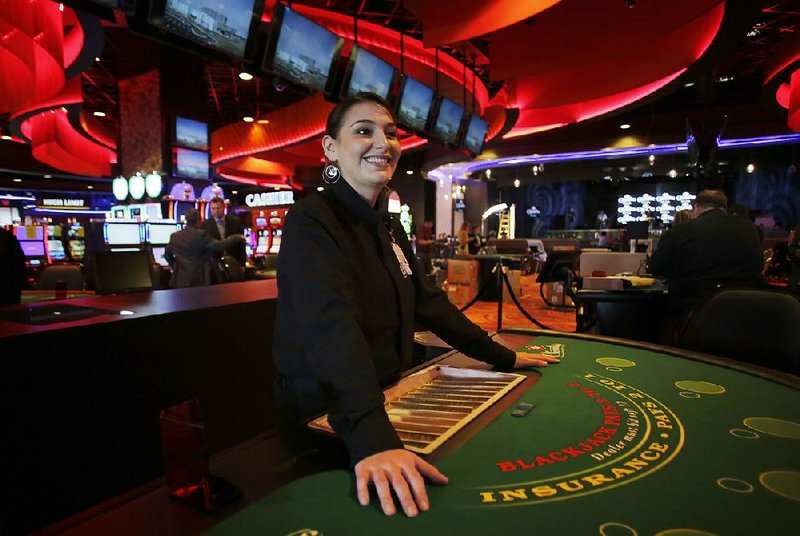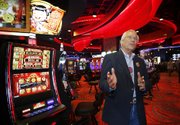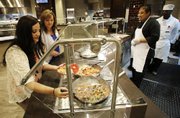ROLAND, Okla. -- When a visitor steps into the new Cherokee Casino & Hotel here, they're greeted by dealers at table games, flashing and buzzing electronic slot machines, a view of a stage perched above the lounge and an expansive buffet.
"We want guests to understand when they've walked in the door, they've walked into an entertainment environment," said the casino's General Manager Chad McReynolds. "It lets them know they've arrived somewhere special."
The state-of-the-art gambling complex on the border of Arkansas and Oklahoma opens Tuesday, and its employees were scurrying last week to make sure everything is just right. In the casino, workers tested procedures and equipment, while in the Lee Creek Tavern, a band warmed up while commercials were being taped.
Construction began in April 2014 on the Cherokee Nation's $80 million project, located just off Interstate 40 and a short drive west of the Arkansas border. It includes a multistory 120-room hotel that's visible from the interstate.
The tribe's gambling operation includes 850 electronic games as well as table games and a poker room. The hotel is expected to be ready for guests in the first week of July.
The casino complex will add 300 jobs. It will compete with another American Indian operation, the Choctaw Casino Hotel in Pocola, Okla., also across the border from Fort Smith, Arkansas' second-largest city.
Steve Bourie, author of the American Casino Guide and owner of americancasinoguide.com, said casinos across the nation are in a fiercely competitive environment where style, ambiance and entertainment have become vital selling points.
He said the casinos in Atlantic City didn't adapt because they felt they had a captive market, and when casinos opened in nearby states, the Atlantic City operations crumbled.
"Today, they need to do something to differentiate themselves," Bourie said.
Five of Oklahoma's Indian tribes, including the Cherokee Nation, have large-scale casino operations close to the Arkansas line. Many have been upgraded in recent years, adding new or expanded casino floors and nongambling amenities such as hotels, restaurants and spas.
Arkansas has no tribal-owned gambling but betting is allowed on greyhound races at Southland Park in West Memphis and thoroughbred races at Oaklawn Park in Hot Springs. State law allows gambling on electronic devices at the racetracks similar to devices offered at out-of-state casinos.
Cherokee Nation Principal Chief Bill John Baker said that while the Roland location isn't the biggest casino complex the tribe owns, it encompasses the lessons learned at its other operations.
"This is first class," he said. "I'll put this against anybody."
The new casino-hotel in Roland will displace the tribe's older 50,000-square-foot Cherokee Casino Roland operation, where the tribe opened its first Cherokee Nation Bingo Outpost in 1990. The old casino and hotel eventually will be demolished.
In September, the Cherokee Nation said a casino-hotel will be part of a $170 million retail development in Tahlequah, Okla. The three-phase project is expected to take five years to complete. In West Siloam Springs, Okla., the tribe operates the Cherokee Casino & Hotel, which was upgraded in 2010 and now has 1,500 electronic games, table games and a 140-room hotel.
Cherokee Nation Entertainment is the wholly owned gambling, hospitality, retail and tourism arm of the Cherokee Nation. It runs the Hard Rock Hotel and Casino in Tulsa; seven Cherokee Casinos, including a horse-racing track; four other hotels; two golf courses; and retail outlets. It employs about 3,800 people across all of its operations.
Last week, Cherokee Nation Businesses, which includes Cherokee Nation Entertainment, reported record revenue of $829 million for 2014, $48 million more than in 2013. It saw net income of $105 million, up 8 percent from 2013.
American Indian-owned casinos in Oklahoma had revenue increases well above industry trends in 2013, according to a report released in March. Oklahoma ranked second for revenue with $3.7 billion for 2013, trailing California with $7 billion. Together the two states made up almost 40 percent of all revenue generated by Indian-owned casinos.
The 479 gambling operations in 28 states generated $28.3 billion in gambling revenue in 2013, an all-time high but an increase of only 0.5 percent compared with the year before. The casinos saw an increase of 2 percent in total revenue in 2012 and a 3 percent gain in 2011, still well below the pre-recession gains of 7 percent in 2007, according to Casino City's Indian Gaming Industry Report.
Alan Meister, an economist with Nathan Associates Inc., which wrote the report, said a struggling economy and increased competition for gambling dollars is limiting growth.
In 2013, Oklahoma had 124 gambling facilities, the highest total in the country, many of them small operations. The total number of gambling machines in Oklahoma increased 2.5 percent to just shy of 70,000, while the number of table games decreased by 3 percent to 785.
Indian-owned casino operations have added hotels and other nongambling amenities in recent years. Across the United States, nongambling revenue was up nearly 5 percent to $3.6 billion. Nongambling revenue has outpaced gambling revenue in 10 of the past 13 years, according to the report.
Oklahoma is doing well in this area, with the state seeing its nongambling revenue increase nearly 14 percent in 2013, to $580.5 million.
Bourie said casinos today have two customer bases, gamblers and tourists. He noted that unless an area has little competition, both are key to a casino's ongoing success and growth potential.
""There should be a reason to visit these places," Bourie said. "It's another reason to get people in the door."
SundayMonday Business on 05/17/2015



